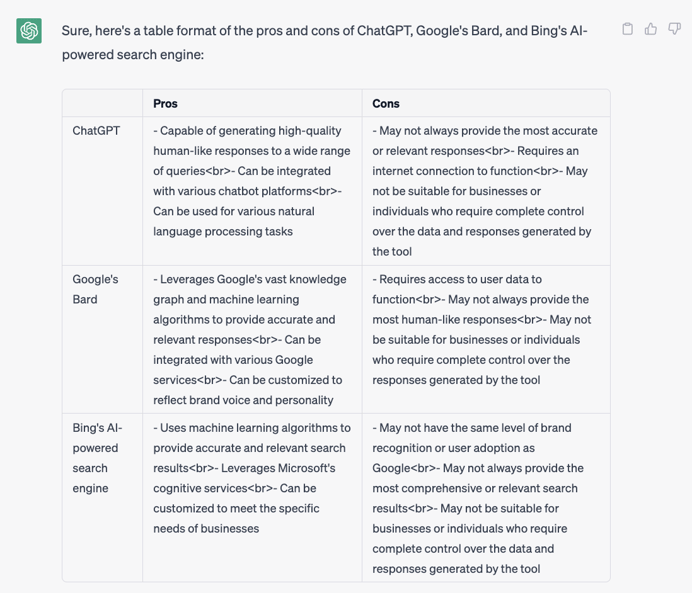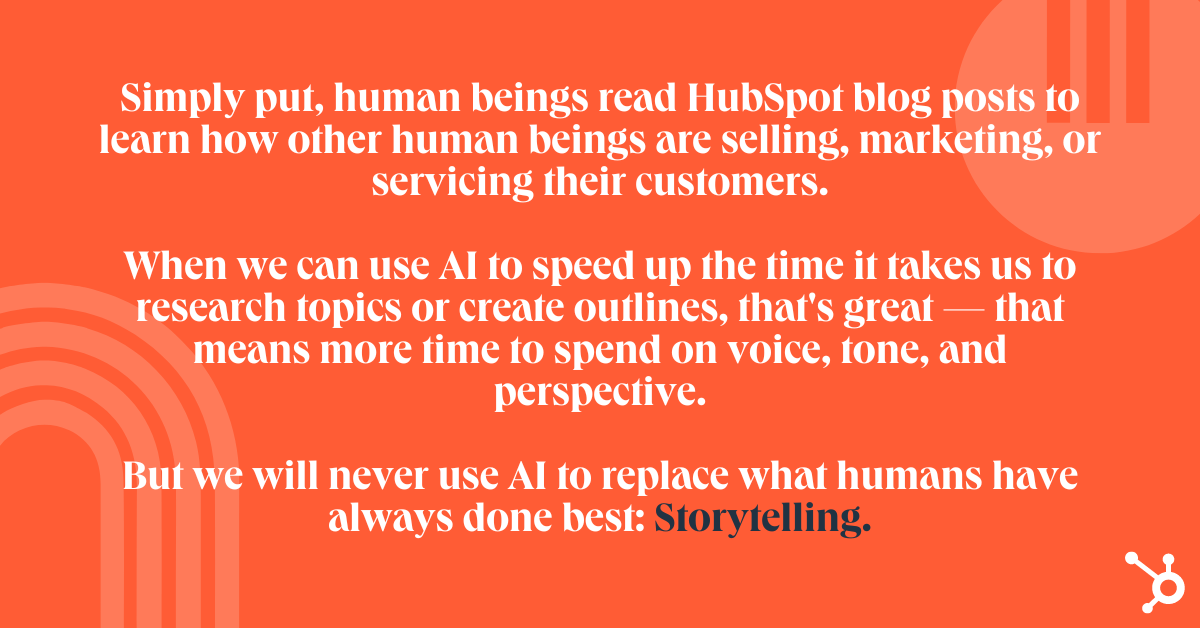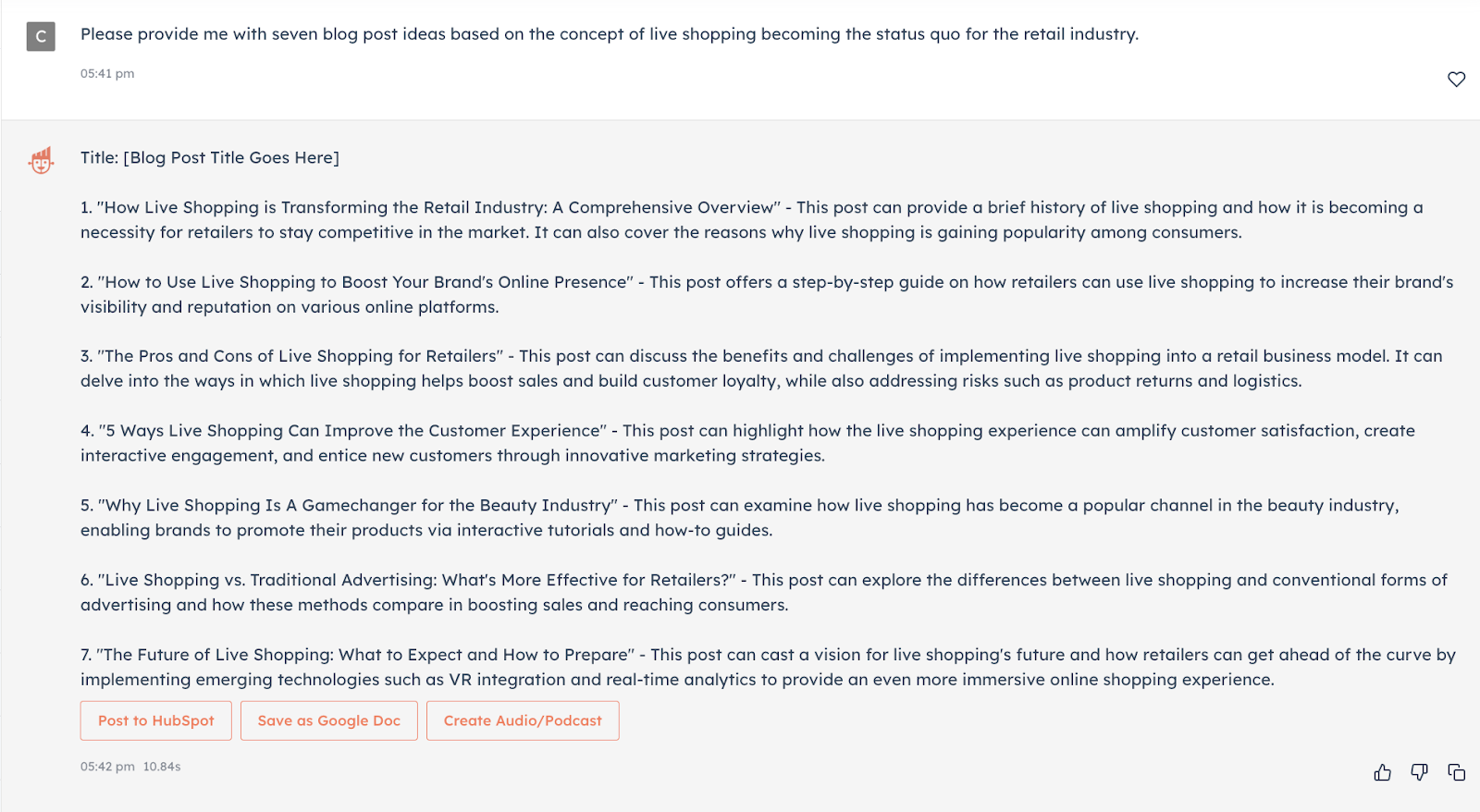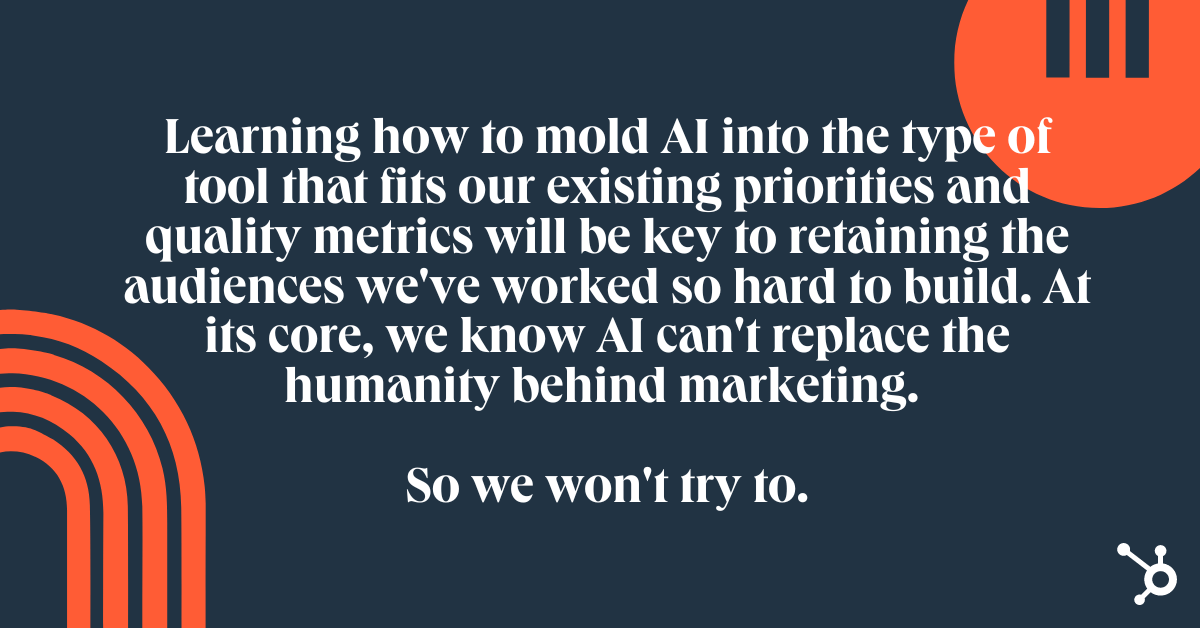
Ah, AI. It’s quickly become one of the buzziest words of 2023, akin to the popularity of the phrase “new normal” in 2022.
And for good reason. AI is poised to completely revolutionize the ways in which we work, interact, and even play.
I’ve been on the HubSpot Blog team for over five years, and in that time, I’ve seen plenty of changes. Back in 2017, for instance, we completely upended our blog infrastructure with the introduction of the pillar-cluster model.
And then, in 2018, we ditched our weekly “throw spaghetti at the wall and see what sticks” brainstorming process in favor of something a little more, well, efficient: the Search Insights Reports, which we still use today.
But none of these changes seem to compare to what’s coming with AI. Here, I’ll explain how HubSpot’s Blog team plans to leverage AI without sacrificing the “human element” that makes our content successful in the first place.
(P.S. We’re still figuring this out just like you are, so think of this as a working doc that I’ll update periodically as we shift our AI strategies in the future.)
How the HubSpot Blog Team Leverages AI
1. The HubSpot Blog Team Will Use Generative AI to Learn About Topics Faster — But We Won’t Use AI Alone to Create Content.
One of the strongest benefits of generative AI is its ability to scan the web and provide concise, helpful responses based on vast sources of information.
In other words: As a writer, I don’t turn to Google first anymore for information. Instead, I turn to AI.
For instance, the other day I needed to write a post about — ironically — the differences between ChatGPT, Google’s Bard, and Bing’s new AI-powered search engine.
So I asked ChatGPT: “Can you tell me the differences between ChatGPT, Google’s Bard, and Bing’s AI-powered search engine? Please put the pros and cons in a table format.”
Here’s what I got back:

Notice I didn’t ask ChatGPT to write the post for me.
On our team, we are not using AI to write full posts. Instead, our criteria is as follows:
- We will never use generative AI to write a full blog post, start-to-finish, without any editing for voice, accuracy, or adding a unique, human perspective.
- We will typically use AI more for cut-and-dry, straightforward, tactical posts. Topics like “The 11 Best Ways to Send Large Files” perform particularly well using AI; but more complex, trendy, or thought leadership-type content do not.
- We will use AI to brainstorm topics or research ideas, but we will always do our own follow-up research to ensure the information is accurate, and to limit potential biases.
As Kaitlin Milliken, HubSpot Blog’s Program Manager & Content Editor, shares: “AI is a big part of my research process. Certain product descriptions are vague or don’t offer enough information about what makes the software stand out. In these cases, I’ll ask AI what makes a certain product unique. It will give me a list of features that can then help inform my writing/editing.”
Simply put, human beings read HubSpot blog posts to learn how other human beings are selling, marketing, or servicing their customers. We want to respect that trust by continuing to create content that is meant to educate, engage, and delight.
When we can use AI to speed up the time it takes us to research topics or create outlines, that’s great — that means more time to spend on voice, tone, and perspective.
But we will never use AI to replace what humans have always done best: Storytelling.

2. The HubSpot Blog Team Will Leverage Generative AI to Create Outlines … But Not Full Posts.
As previously mentioned, our Blog team will not be using generative AI to create full blog posts.
That doesn’t mean we won’t leverage the power of AI to greatly cut down the time we spend writing. It simply means we’ll treat AI outputs similar to how we might treat outlines or freelance drafts.
Namely: AI outputs can act as the first draft of an article, but not the final copy.
Consider, for instance, a post that provides 34 definitions of SQL keywords, operators, and statements, which HubSpot Blog Manager, Marketing Clint Fontanella recently wrote for the Website Blog. A post of that length would typically require weeks of research and writing.
With AI, Fontanella told me it took roughly 40% of the time to create it.
As he puts it, “AI is going to remove the manual process of content creation so writers can become marketers again and focus more on the creative process. AI copywriting will eliminate tedious tasks like writing definitions and creating outlines, so writers can spend more time on optimizing the post (likely using AI tools) with things like custom multimedia, interactive modules, high-intent internal linking, and more.”
Particularly for more cut-and-dry topics like lengthy listicles, it’s imperative our writers lean into AI to save their time for more complex pieces, or to up-level the multimedia elements included in their posts.
Additionally, many of our writers use AI to write sections of blog posts.
For instance, Tristen Taylor, HubSpot Blog team’s Associate Marketing Manager, told me, “Before using AI, I often found myself rewriting introductions and conclusion paragraphs in blog posts. Now that I have access to these tools, my time needed for completing blog posts or articles has been cut down tremendously because it can capture the tone, intent, and targeted keywords I need through refined AI prompts.”
She adds, “It also allows me to refocus my work more on the content or information of value that readers are looking for, instead of ruminating over small details at the beginning or end.”
3. The HubSpot Blog Team Will Take Advantage of Generative AI as Our New, Trusty Brainstorming Sidekick.
I’ve been reading a lot about how live shopping is going to become the new “norm” in retail, and I knew there could be an interesting angle to write. But I couldn’t fully flesh one out.
So I turned to ChatSpot, HubSpot’s new AI-powered chatbot, and asked, “Please provide me with seven blog post ideas based on the concept of live shopping becoming the status quo for the retail industry.”
Here’s its response:

Not too shabby, huh? From there, I can workshop by myself or with a colleague to formulate the final topic. But in this case, ChatSpot didn’t just save me time — it also introduced a new perspective and more creative, interesting ideas that I hadn’t previously considered.
In other words, one of the biggest benefits of generative AI is its ability to act as your new, always-available, infinitely-creative colleague.
And this makes all of HubSpot Blog team’s in-person brainstorming sessions much more effective and compelling.
4. The HubSpot Blog Team Will Experiment with AI-Generated Videos for Our Blog Posts.
Video is more important than ever. In fact, our 2023 State of Marketing report found that video is the most popular and effective media format for the fourth year in a row.
But creating videos takes time and resources. And there are some topics, like CSS Grid Layouts, that were previously not worth the effort it took in terms of potential video MSV.
This left some major gaps in our content strategy. While CSS Grid Layouts might not be the snazziest YouTube video (I get it … it’s probably not going to go viral), it is a topic that is complex and potentially confusing — making it an ideal candidate for a quick, easy how-to video for our readers who are interested in learning more about CSS layouts.
Enter: Veed.io, a video editing software with AI tools built-in, such as their AI image generator and AI text reader.
The Website Blog leveraged Veed to create their own CSS grid video with an AI-generated voice-over in less than an hour.
Plus, as our team leans into AI for brainstorming, outlining, and researching, we will be able to find more time to experiment with projects like this one.
For our team, this is just the beginning. We will continue to test and iterate on our AI-generated video strategy to expand videos across Blogs for greater impact in the months to come.
5. The HubSpot Blog Team Will Use Generative AI for Meta descriptions, Social Summaries, and Email Descriptions.
For some reason, I often hit the greatest writer’s block after I’ve finished a post and I’m asked by a social media manager or email manager to summarize it.
In some ways, perhaps it’s most difficult because I know the topic too well. Everything in my post seems important. How can I possibly pick what is most relevant to include?
Quickly figuring out the right messaging to promote your content is one of the most powerful opportunities with AI. In fact, I worked with ChatSpot to come up with the meta description for this post:

Jamie Juviler, Managing Editor of the Website Blog, also leverages AI for meta descriptions. He suggests feeding your introduction paragraph into an AI chatbot, and then asking it to produce a 100-150 character meta description.
Finding small ways to elevate your promotional copy by leveraging AI is key to harnessing its full potential.
HubSpot’s Blog Team Will Continue to Write Human-to-Human, First
One more thing — we want to lead with transparency for our audiences, so we do promise this: On any post we write that has been AI-supported (or AI-generated, even if it has been human-edited), we will be sure to leave a disclaimer that lets you know that we leveraged AI to complete the post.

It’s also important to note that our team is learning as we go. Similar to the advent of any new, exciting technology, AI comes with plenty of benefits … and plenty of drawbacks.
Learning how to mold AI into the type of tool that fits our existing priorities and quality metrics will be key to retaining the audiences we’ve worked so hard to build. At its core, we know AI can’t replace the humanity behind marketing. So we won’t try to.

![Free Guide: How to Use AI in Content Marketing [Download Now]](https://no-cache.hubspot.com/cta/default/53/3e25e192-30c3-40c1-a7da-a4d054c9e157.png)




